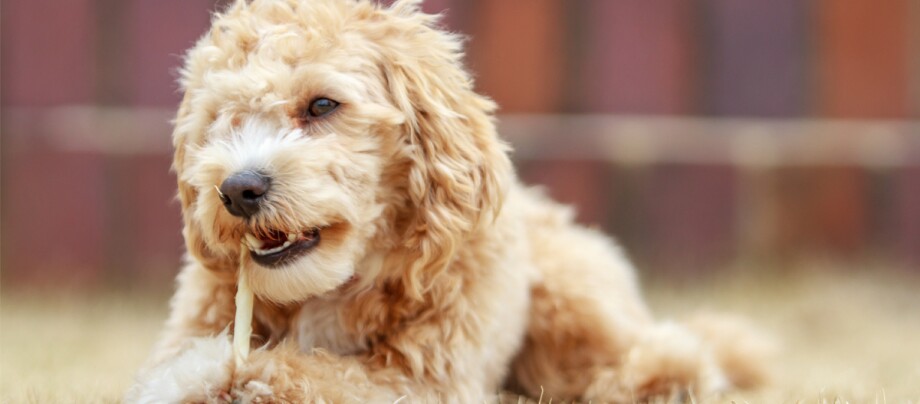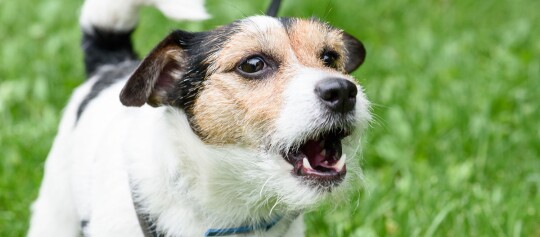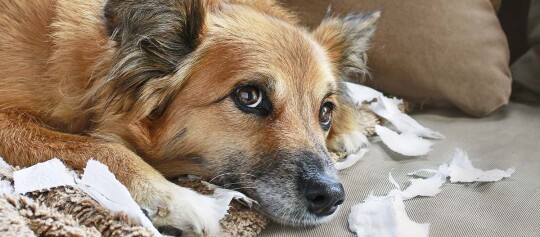Maltipoo – fluffy companion dog for the whole family
18.02.2024 - Reading time: 9 minutes

The Maltipoo combines the kindness of the Maltese with the intelligence of the Poodle. This mix results in an alert, happy and playful family dog that is easy to train and handle in everyday life. Whether playing with the kids, practising tricks with mum or snuggling with grandma – a Maltipoo is happy, whatever it is doing.
- The Maltipoo – a fluffy bundle of fun
- Character of the Maltipoo
- Maltipoo profile
- Is the Maltipoo a yappy dog?
- Is the Maltipoo easy to train? Training and looking after a Maltipoo
- How much exercise does a Maltipoo need?
- Taking care of a Maltipoo
- Are Maltipoos suitable for allergy sufferers?
- How much does a Maltipoo cost?
- Special characteristics of the Maltipoo
The Maltipoo – a fluffy bundle of fun
Both the Poodle and the Maltese are well-established, well-known and popular breeds. The little, white Maltese has long been kept as a companion dog or even lap dog by women of high social standing and member of royalty. However, for families with young, very active children, the Maltese is perhaps a little too small and fragile.
Breeding the Maltese with the Miniature Poodle produces a somewhat larger, intelligent and easy-to-train dog with moderate exercise requirements. The Poodle’s genes also increase the chance of having a dog that sheds very little, or not at all. Although the Maltipoo is considered a designer dog and is viewed with scepticism by breeders, it continues to grow in popularity with every passing year.
Character of the Maltipoo
Breed-typical characteristics of both parents are present in the temperament of this small, fluffy dog. However, the small Poodle breeds and the Maltese are so similar in character that there are unlikely to be any surprises when mixing the two together. The Maltipoo is a happy, funny and consistently good-tempered dog. It loves cuddling up and can spend hours with you on the couch. This little dog’s qualities shine through in its interactions with children: it is very friendly and playful.
NewsletterMaltipoo
Breed | Maltipoo |
Origin | USA (nowadays worldwide) |
Classification | mixed breed (Maltese crossed with a Miniature or Toy Poodle) |
Size | 28 to 35 centimetres shoulder height |
Weight | 3 to 6 kilograms |
Physical build | small and slim |
Eyes | large to very large, dark |
Ears | small to medium in length, floppy |
Fur and colour | soft, wavy or curly, fluffy coat in white, apricot, brown, black or brindled |
Special features | easy-going companion dog |
Character | friendly towards people, good with children, playful and happy |
Care | regular brushing and grooming, eyes and ears require care |
Health | predisposed to some hereditary diseases such as eye and joint problems |
We have the best products for your Maltipoo!
Is the Maltipoo a yappy dog?
Young Maltipoos in particular can be quite over-enthusiastic at times and do tend to bark a lot. Although they are essentially just as friendly towards visitors and strangers as they are towards their owners, they will not hesitate to loudly announce their arrival. To prevent your dog’s tendency to bark from becoming a problem, it is important to behave correctly from the very beginning. Too much attention – which can also include telling your dog off – may encourage barking. This creates a misunderstanding between the dog and its owner, because the dog feels validated by the attention and will bark even more intensely the next time. In actual fact, it is better to praise your dog as soon as it is behaving correctly, i.e. giving it attention only after it has stopped barking. The best way to get annoying barking under control is to consult a dog trainer.
Is the Maltipoo easy to train? Training and looking after a Maltipoo
If you were to describe this little fluffball in a single word, ‘uncomplicated’ would be a good choice. A well-socialised Maltipoo will make a well-rounded companion that is great with all sorts of other people and dogs. So, is the Maltipoo suitable for first-time owners? Essentially, yes. But that does not mean that the Maltipoo does not require any guidance whatsoever. When you bring a Maltipoo puppy into your home, its socialisation and training start from day one. Be pro-active, consistent and patient during this process. If you have never had a dog as a companion before, it would be wise to learn more about training before getting one. Things sometimes do not turn out quite as you expect when it comes to practical implementation, because theoretical knowledge alone is not enough. Bear in mind that dogs ‘read’ a lot of your body language – you should be aware of this when interacting with your four-legged friend. To ensure that everything goes well right from the start in terms of training and socialisation, it is best to sign your young Maltipoo up for dog training lessons. In these lessons, your little fluffy friend will learn how to get along well with other dogs and how to follow your commands early on. If you are new to dog ownership, dog training lessons also give you the opportunity to meet other owners and share your experiences with them.
Did you know: Even if your Maltipoo is already an adult, attending dog training lessons can still be useful – especially if you are a first-time owner.
The Maltipoo does not tend to react fearfully to environmental stimuli, but it should still come into contact with many elements of its future life during its first few weeks.
How much exercise does a Maltipoo need?
Firstly, the Maltipoo has an even-tempered, uncomplicated nature. Secondly, the breed’s typical characteristics, including its build, mean that its need for exercise is moderate. To be more specific, this means that a Maltipoo naturally needs to be exercised every day, but this does not have to involve walking for miles and miles. Several shorter walks around the local park are enough to keep it perfectly content. A Maltipoo therefore requires a relatively modest amount of exercise.
These qualities are a great advantage if you live in the city, for instance, or want to take your dog to the office with you. This fluffy, dainty four-legged friend is also ideally suited to life in a small apartment. However, to ensure that your dog is settled and content, you should always make sure that you spend enough time giving them attention. This should also include providing it with mental stimulation. Intelligence games, search games and dog tricks are ideal ways to keep this little mixed-breed dog occupied. If you want to encourage your cuddly little one in a more targeted way, try out a dog sport with it. Activities that you could do with your dog include agility, dog dancing or obedience. It goes without saying that the intensity of these activities should be adjusted to match this little dog’s capabilities. A great side effect of fun, fitness and mental challenges for your Maltipoo is that you strengthen and deepen your bond at the same time, meaning that you are doing something good for both of you.
Taking care of a Maltipoo
The Maltipoo’s coat ranges from soft and long to curly. This is determined by whether it is the coat of the Maltese or that of the Poodle that is dominant. Both coat types require comprehensive care involving daily brushing and regular visits to the dog groomer for clipping. The Maltipoo does not have an undercoat and gets cold easily. In winter, a dog coat is an essential piece of kit when going for walks.
Are Maltipoos suitable for allergy sufferers?
We often read and hear that Poodle mixes, from Maltipoos to Labradoodles, are ideal for people with pet hair allergies or even ‘non-allergenic’, but this is not strictly correct. While it is true that a poodle mix like the Maltipoo sheds relatively little hair, the allergenic substances can still be found in its dander and saliva. Only the distribution of these allergens around the home via its hair is reduced. A Maltipoo cannot be unconditionally recommended for a family member who is allergic to certain animals. In this instance, it would be advisable to seek advice from a doctor before deciding to get a pet. If necessary, tests can clarify whether a dog of this breed will be suitable for you. It is better not to take a risk by getting a dog and just hoping for the best. Otherwise you run the risk of having to give up your beloved dog at a later date – a painful experience that you should spare yourself and the animal.
How much does a Maltipoo cost?
It is hard to give an average price for a Maltipoo, but generally speaking, a Maltipoo puppy will cost somewhere between 1,500 and 2,000 euros. If you are interested in one of these cute, fluffy dogs, the price should not be your primary consideration. It is much more important that you get your pet from a responsible breeder. But how can you tell if a Maltipoo breeder is responsible?
Here are some tips to bear in mind when looking to buy a Maltipoo puppy:
- A reputable breeder will show you their dogs in their actual living environment, which, ideally, is inside the home together with the family. You should be able to meet all the puppies and of course the mother.
- The animals’ environment should look neat and clean, while the mother of the puppies should seem healthy and relaxed.
- The breeder should not pressure you into buying a puppy, and you should be able to visit the animals several times before deciding to get a little Maltipoo.
- The breeder should give direct answers to your questions about the dogs and how they are bred.
- The breeder should care deeply about the dogs’ health, including veterinary care. They should have already started vaccinating and worming the puppies. If you decide to buy one of their puppies, they should give you a vaccination record and breeding papers.
They should also ask you questions about your knowledge of dogs, because they want to make sure that their animals will be in good hands. If, on the other hand, you are offered a dog on neutral territory, such as a car park, you should not agree to buy it. Be suspicious if you are only shown a single animal and the seller seems evasive when asked questions about the mother or other puppies. A reputable breeder has nothing to hide. You should also not accept an ‘untidy apartment’ as a reason, nor should you buy a Maltipoo puppy that looks unwell. Look at its eyes and nose, for example. These should be free from discharge and secretions. A healthy puppy should seem alert and playful. As very young animals tire quickly, it is not always possible to assess this with certainty, which is why at least one more visit is recommended. Do not buy any puppies younger than twelve weeks old. Young animals should stay with their mother and siblings until at least this age to ensure healthy social and psychological development.
Special characteristics of the Maltipoo
Like most other small dogs, the Maltipoo is prone to problems with its patella (kneecap). Sometimes the groove into which the kneecap normally slides is too shallow, causing it to pop out. The dog will then typically run on three legs for a few metres at a time. See your vet if you notice that your dog is walking abnormally. Regular, steady movements such as long walks strengthen the muscles and are incredibly important, even for a small dog such as this. The Maltipoo is also susceptible to eye diseases.

